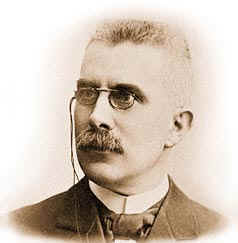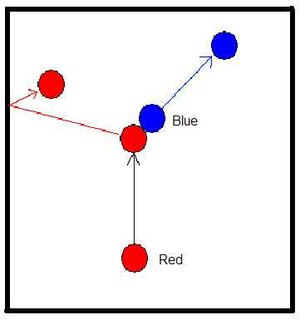|
Mastering
Reactions: Controlling Systems at Equilibrium
LeChatelier's Principle |
| |
|
|
A Generic Equation Describing
an Equilibrium
2A(g) + B(aq)  3C(g) + D(aq) + heat
3C(g) + D(aq) + heat |
| |
| The
Principle: In
a closed system, when a system at equilibrium experiences a change, the
equilibrium will shift so as to counteract the change.
Top |
Henri LeChatelier:
French Mineralogical Engineer
http://homepage.mac.com/dtrapp/people3/LeChatelier.jpg |
| |
| Concentration's
Effect:
Increasing
Concentration: If the concentration of a gaseous or aqueous
species is increased, the equilibrium will shift away from that
increase.
Decreasing
Concentration: If the concentration of a gaseous or aqueous
species is decreased, the equilibrium will shift toward the
decrease.
Top |
Example: Increase [A] then
the equilibrium will be shifted to the right (forward reaction)
2A(g) + B(aq)
 3C(g)
+ D(aq) 3C(g)
+ D(aq) |
| |
| Temperature's
Effect:
Increasing
temperature: If the temperature is increased, the equilibrium will
shift away from the heat term.
Decreasing
temperature: If the temperature is decreased, the equilibrium
will shift toward the heat term.
Top |
Example: If the temperature is
increased, the equilibrium will shift to away from the heat term.
(in this case the reverse reaction.)
2A(g) + B(aq)  3C(g) + D(aq) + heat
3C(g) + D(aq) + heat |
| |
Pressure's
Effect:
Increasing Pressure:
If the partial pressure of a gas is increased, the
equilibrium will shift to the side with the least number of gas
molecules.
Decreasing Pressure:
If the partial pressure of a gas is decreased, the equilibrium will shift
to the side with the greatest number of gas molecules.
Top |
Example: If the pressure of
C is decreased, then the equilibrium will shift to the right (in this case
the forward reaction.)
2A(g) + B(aq)  3C(g) + D(aq) + heat
3C(g) + D(aq) + heat |
| |
| Other:
Sometimes catalysts are considered, but it should be recognized that
catalysts impact the forward and reverse reactions equally; thus they
effectively have no impact.
Top |
| |
|

http://2.bp.blogspot.com/_Z0w4F5i43Rk/Rrw3KQ8uzGI/
AAAAAAAAAC0/qwxPWUE2XTQ/s320/Figure+01.jpg |
LeChatelier's
Principle and Collision Theory
Collision Theory:
In order for a chemical reaction to occur, there must be a collision
between reactant molecules, it has to take place in the correct place, and
it has to have the right amount of energy.
LeChatelier's Principle can be thought of
different ways to affect the probability of a having an effective
collision.
Top |
